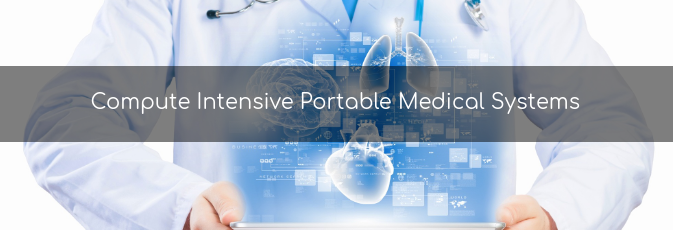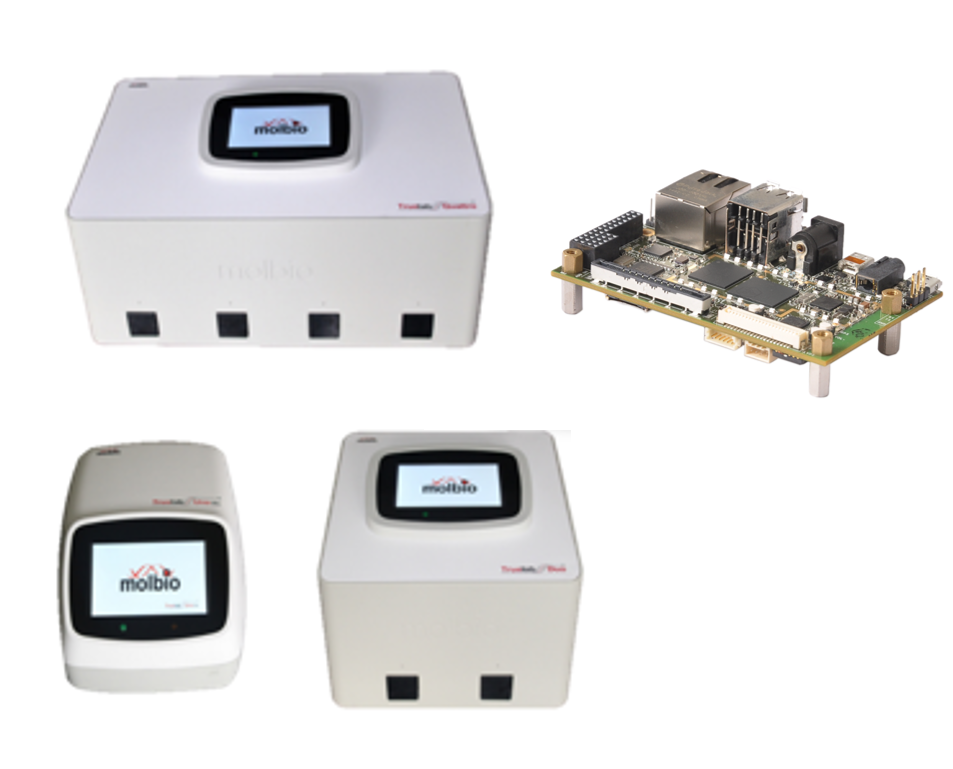The Challenge
With more access to consumer data than ever before, health organizations face significant challenges in managing, interpreting and protecting patient data. Interoperability of disparate data sources must be addressed as more devices become connected and need to communicate with each other and with the health organization.

Legacy medical imaging systems have used stand-alone DSPs, microcontrollers and FPGAs to perform processing steps such as digital interpolation, decimation, filtering, and reconstruction. These devices also run on inefficient proprietary operating systems producing excess heat causing patient discomfort. Power hungry image processing algorithms that run on such dedicated hardware have become exponentially complex, rendering the CPU, graphics, DSP, and video performance capabilities inadequate. Embedded designers have to also make strict tradeoffs between size, weight, battery life, performance, and cost for portable devices, often compromising on the key requirement of patient comfort.
Molecular Diagnostics is the most recent development in Diagnosis of infectious diseases like the coronavirus. This works on the principle of DNA amplification and thus makes it feasible for early diagnosis of the disease because of its excellent sensitivity and specificity. Unfortunately, this technique is restricted to large central laboratories owing to the need for complex and expensive infrastructure, highly skilled manpower, special storage conditions and need for batch testing. This results in high turnaround times and poses major logistics challenges such as sample degradation, contamination, delays, etc.
Penguin Edge’s Solution
Penguin Edge Computing’s integrated solutions address the above issues with cost-effective production ready hardware. These solutions fully complement the medical fraternity’s domain expertise by taking the compute complexity out of the equation. Penguin Edge’s family of multiple generations of Qualcomm
® Snapdragon™ processors provide cost effective and high-compute intense CPU, GPU, DSP, and ISP for battery powered connected handheld medical imaging devices. Devices created based on these platforms offer intelligent data analysis, predictive analytics and continuous patient state monitoring resulting in successful diagnoses.
Molbio Diagnostics has been in the forefront of the global fight in control and management of devastating infectious diseases. Their near-patient molecular imaging legacy platform that was being used to detect a host of infectious diseases very early and at point of care leveraging Micro Electro-Mechanical Systems (MEMS) and Polymerase Chain Reaction ran into integration and connectivity issues. Penguin Edge’ compact yet fully-featured SBC based on the 64-bit Snapdragon 410 processor (APQ8016E) provided an excellent replacement for their next generation product.

Their new range of fully automatic portable and battery operated real time quantitative PCR analyzers enable fast, accurate and reliable near-care testing.
These products have recently been approved to confirm Covid-19 cases by the Indian Council of Medical Research. They are capable of performing up to 48 Tests in 8 Hours and are currently being deployed at multiple hospitals for rapid testing and screening.
Healthcare systems must have the infrastructure, resources and processes in place to crunch the inundation of patient data and extract from it actionable insights. Our platforms’ edge compute capabilities enable this for caregivers to use meaningfully.
Medical devices typically require guaranteed long-term supply assurance for availability of parts and no product obsolescence. Customers would also prefer access to next generation Qualcomm Snapdragon technologies, to ensure smoother migration and to remain competitive in the marketplace. Penguin Edge ensures these, apart from having a strict version control for continued hardware/software compatibility.

 Legacy medical imaging systems have used stand-alone DSPs, microcontrollers and FPGAs to perform processing steps such as digital interpolation, decimation, filtering, and reconstruction. These devices also run on inefficient proprietary operating systems producing excess heat causing patient discomfort. Power hungry image processing algorithms that run on such dedicated hardware have become exponentially complex, rendering the CPU, graphics, DSP, and video performance capabilities inadequate. Embedded designers have to also make strict tradeoffs between size, weight, battery life, performance, and cost for portable devices, often compromising on the key requirement of patient comfort.
Molecular Diagnostics is the most recent development in Diagnosis of infectious diseases like the coronavirus. This works on the principle of DNA amplification and thus makes it feasible for early diagnosis of the disease because of its excellent sensitivity and specificity. Unfortunately, this technique is restricted to large central laboratories owing to the need for complex and expensive infrastructure, highly skilled manpower, special storage conditions and need for batch testing. This results in high turnaround times and poses major logistics challenges such as sample degradation, contamination, delays, etc.
Legacy medical imaging systems have used stand-alone DSPs, microcontrollers and FPGAs to perform processing steps such as digital interpolation, decimation, filtering, and reconstruction. These devices also run on inefficient proprietary operating systems producing excess heat causing patient discomfort. Power hungry image processing algorithms that run on such dedicated hardware have become exponentially complex, rendering the CPU, graphics, DSP, and video performance capabilities inadequate. Embedded designers have to also make strict tradeoffs between size, weight, battery life, performance, and cost for portable devices, often compromising on the key requirement of patient comfort.
Molecular Diagnostics is the most recent development in Diagnosis of infectious diseases like the coronavirus. This works on the principle of DNA amplification and thus makes it feasible for early diagnosis of the disease because of its excellent sensitivity and specificity. Unfortunately, this technique is restricted to large central laboratories owing to the need for complex and expensive infrastructure, highly skilled manpower, special storage conditions and need for batch testing. This results in high turnaround times and poses major logistics challenges such as sample degradation, contamination, delays, etc.
 Their new range of fully automatic portable and battery operated real time quantitative PCR analyzers enable fast, accurate and reliable near-care testing.
These products have recently been approved to confirm Covid-19 cases by the Indian Council of Medical Research. They are capable of performing up to 48 Tests in 8 Hours and are currently being deployed at multiple hospitals for rapid testing and screening.
Healthcare systems must have the infrastructure, resources and processes in place to crunch the inundation of patient data and extract from it actionable insights. Our platforms’ edge compute capabilities enable this for caregivers to use meaningfully.
Medical devices typically require guaranteed long-term supply assurance for availability of parts and no product obsolescence. Customers would also prefer access to next generation Qualcomm Snapdragon technologies, to ensure smoother migration and to remain competitive in the marketplace. Penguin Edge ensures these, apart from having a strict version control for continued hardware/software compatibility.
Their new range of fully automatic portable and battery operated real time quantitative PCR analyzers enable fast, accurate and reliable near-care testing.
These products have recently been approved to confirm Covid-19 cases by the Indian Council of Medical Research. They are capable of performing up to 48 Tests in 8 Hours and are currently being deployed at multiple hospitals for rapid testing and screening.
Healthcare systems must have the infrastructure, resources and processes in place to crunch the inundation of patient data and extract from it actionable insights. Our platforms’ edge compute capabilities enable this for caregivers to use meaningfully.
Medical devices typically require guaranteed long-term supply assurance for availability of parts and no product obsolescence. Customers would also prefer access to next generation Qualcomm Snapdragon technologies, to ensure smoother migration and to remain competitive in the marketplace. Penguin Edge ensures these, apart from having a strict version control for continued hardware/software compatibility.